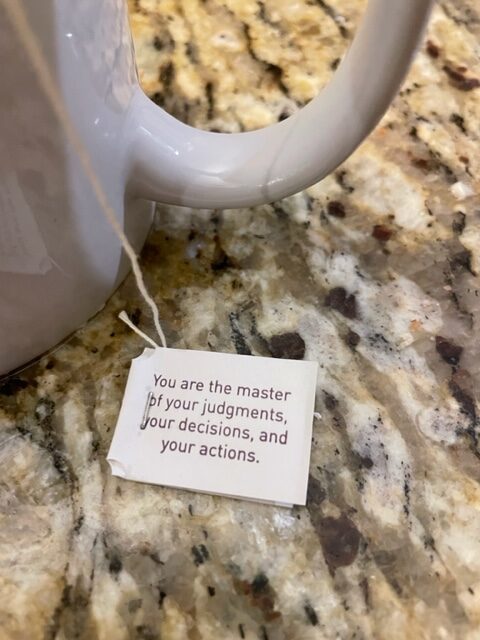It’s not you, it’s me…owning our anger. We are in control of our own reactions.

Where does anger come from?
What makes you angry? If your answer to this question sounds something like “because ___ makes me mad!” then it’s time we dig a little deeper. We all have triggers that ignite a flame of anger inside us. One of mine is when I perceive that someone is unappreciative or ungrateful for an effort I’ve made. Yours might be your kids not keeping their room clean or your spouse putting the toilet paper on the wrong way. Whatever your triggers might be, let’s take a closer look at why these things make us feel angry.
Let’s break down my trigger as an example. When I feel like someone is being ungrateful when I’ve made some kind of effort, done something I thought would make them happy or that would help them somehow, and I feel angry about their response (or lack of) there are two things going on. First, I’m making an assumption about someone else’s feelings, intentions or situation. We can only ever see things from our own perspective. We can empathize, but we can’t truly know the other persons experience. And second, the feelings of anger I’m experiencing are a result of an unmet expectation on my end. I expected the person to be happy and they weren’t.
When things don’t go the way we think they should go or we are let down for some reason we are left feeling disappointed and angry. The emotion of anger we experience in these situations has nothing to do with the person we feel angry with, rather, with our own internal experience of dealing with unmet expectations. Here’s where owning our anger comes in. The person didn’t MAKE you angry, you made yourself angry by becoming attached to an outcome.
How do we go about owning our anger?
Some legitimate chemical changes happen in our bodies when we start to feel angry and for a minute there we aren’t in control, so first, breathe. Before you react, take three long, slow breaths and just sit with your feelings. Say hello. “Oh, hi there, anger, Let’s figure out why you’re here.” Then find the unmet expectation. Just recognize it. “I’m feeling X because X didn’t happen”. Then try to see the situation from multiple angles. Maybe the person you’re angry with was under a lot of pressure at work or school. Maybe they were running late. Perhaps they had a poor nights sleep, or something is weighing heavy on their heart. Think of all the things that could be going on in this other persons rich and complicated reality that you may be unaware of. Our anger is really more about our perception of another person’s experience and attachment to an outcome than it is about the person we’re angry with.
It’s not you, it’s me.
Something I tell my kids all the time is that the only thing we can control is our own reaction. We are never going to be able to control what other people think, do, or say, however, we can always control the way in which we respond. Our experience of reality is linked to how tightly we cling to our attachments and expectations. Next time you feel anger start to brew remember the saying “it’s not you, it’s me” and try to figure out what need of yours is not being met. Realizing this emotion comes from a place within ourselves is the first step in owning our anger.
Dishes in the sink…
Another trigger for me is when I perceive that my feelings aren’t being considered. The prime example of this in our household is when my husband stacks dishes in the sink. Not just when the dishwasher is full or has clean dishes in it, but all the time. This brings feelings of anger up in me. I mean, the empty dishwasher is right there! How hard is it to put the dishes in there instead of the sink right?! And he KNOWS this bothers me. He basically just doesn’t care how I feel. That’s the story I tell myself which starts the anger rising up.
After I take my deep breaths and acquaint myself with my anger I recognize that the root of my frustration lies in an unmet expectation. Namely that my spouse will recognize my desire not to have dishes sitting in the sink all day unnecessarily and will remember to put his dishes in the dishwasher. I realize that I have made an assumption about his intention. I’ve assumed that he has intentionally ignored my wishes and that he doesn’t care about how I feel. What I’m not seeing through my limited perception is that he has 5 things going on at once in his brain and that he has formed a habit over years of living by himself of stacking the dishes in the sink. He’s not intentionally ignoring my wishes, he’s simply on autopilot.
Shoes by the door…
One of my husband’s triggers is shoes left by the door. It’s the same scenario as me and the dishes. He’ll see shoes near the door and say “how many times do I have to ask for people not to leave their shoes here!”, yet my kids and I keep leaving our shoes there. Why? Because it’s a habit. Growing up I always left my shoes by the door. I took them off when I came inside and they were there again when I was ready to leave. But my habit wasn’t my husband’s habit and shoes piled up by the door happens to be a pet peeve for him. Like I with the dishes, he assumes we are simply ignoring his wishes, when really we’re on autopilot.
The heart of the matter.
What we’ve really got to ask ourselves is why we are so attached to a particular outcome. It’s usually someone else’s behavior we are trying to control…what would happen if we let that go and took matters into our own hands? What if I put my husbands dishes that he stacked into the sink into the dishwasher. What would happen if he picked up my shoes and put them away? How about if I made daily efforts to help people simply because I enjoy making their lives better, with no expectation of appreciation on their part.
We can either choose to be bitter and hold resentment in our hearts or we can choose to come from a place of love. I could put his dishes away yet harbor feelings of animosity toward him. Or I could put them away as an act of love and kindness for my partner. He could pick up my shoes and then tell me later about how he had to do so (again). Or he could pick them up and smile at my seemingly unbreakable habit, loving me in all my imperfection.
So next time you start to get angry, take a deep breath and break it down, it’s a process and you’re going to slip up, but it’s a journey worth taking and the more you do the work the less angry of a person you become.

To subscribe to The Daily Download sign up HERE!

